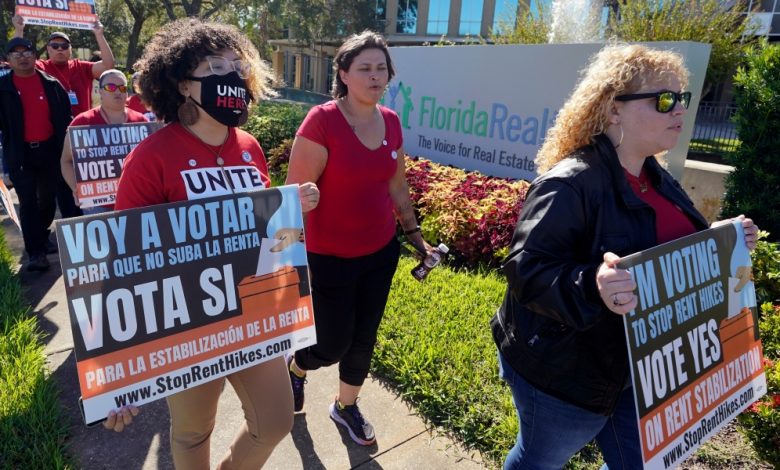Rent controls and affordable housing initiatives were the big winners of Midterms 2022

Electoral measures across the US to build more affordable housing and protect renters from soaring rent increases have been plentiful and performed well in last week’s midterm elections, a sign of growing fears of record-high rents exacerbated by inflation and housing shortages.
Voters approved caps on below-inflation rent increases in three US cities: Portland, Maine, Richmond and Santa Monica in California. Another measure was the lead in counting votes in Pasadena outside of Los Angeles. In Florida, voters in Orange County, which includes Orlando, overwhelmingly approved a rent stabilization measure, but a court ruling means it’s unlikely to go into effect.
There were also dozens of proposals in the Nov. 8 vote to raise money for and approve affordable housing construction, said Diane Yentel, president and CEO of the National Low Income Housing Coalition. Many passed.
“Housing is a successful campaign issue. It’s one that voters are showing up for and it’s one that should prompt policymakers at all levels to act,” Yentel said, adding that even defeat can be a win.
“The act of organizing itself builds strength, it builds power and it builds connections and it builds momentum,” she said.
Calls for more affordable housing and measures to accommodate tenants are growing as homelessness also rises in places outside of urban coastal centers like San Francisco and Los Angeles. Additionally, teachers, police officers and other public workers say they can’t afford to live in the places they work, leading to nightmarish commutes and staff shortages.
Advocates say rent control measures are needed to curb sharp increases that put renters at risk of eviction. They say safeguards are particularly needed now that more companies are acquiring rental housing for profit. In 2018, the US Census Bureau found that businesses owned nearly half of rental units.
“The market is out of control, the government needs to step in and regulate it for there to be stability,” said Leah Simon-Weisberg, a tenant rights attorney and chair of the tenancy committee in Berkeley, California.
Opponents say the rent cap increases costs for landlords, most of whom are mom-and-pop businesses with a handful of units each. Rent restraint will lead to disinvestment in the rental stock and discourage construction of affordable housing.
“Decades of empirical research have shown that these policies are not helping the underlying cause of the housing shortage we now have. If anything, it exacerbates the housing challenge,” said Ben Harrold, public policy manager at the National Apartment Association.
Most states prevent cities and counties from enacting rent stabilization, which was the result of real estate industry lobbying in the 1970s. In cities used to rent regulations, however, voters voted for tighter rent caps and more renter protections.
The California cities of Richmond and Santa Monica easily approved measures to tighten existing rent increase caps to 3%, well below the state cap of 10%. In Oakland, across from San Francisco, voters expanded eviction protections for tenants.
In Portland, Maine, 55% of voters approved a measure to lower an existing CPI rent cap from 100% to 70%. The proposal also mandates a range of other tenant protection measures, such as capping deposits at one month’s rent and requiring 90 days’ notice before rent increases or lease terminations.
A voting measure in Pasadena to limit annual rent increases to 75% of the consumer price index had more than 52% of the vote late Tuesday, and the campaign declared victory. Campaign finance coordinator Ryan Bell said organizers did everything they could to reach voters, but the timing was right too.
“The pandemic has really made it clear that people renting their homes are by definition unsafe. Their housing could be taken away from them for no reason in some cities, and a massive rent increase is effectively eviction,” he said. “There are just more and more stories.”
Meanwhile, the rent cap in Orange County, Florida, which was overwhelmingly approved by voters, has been put on hold. A court ruled that it failed to meet an “extremely high bar” set by a state statute that requires a housing shortage to be determined before a rent cap can be imposed.
Nearly 60% of voters approved the measure after rents rose 25% between 2020 and 2021 and double-digit again this year. The Board of County Commissioners in Orange was due to meet Thursday to decide whether to appeal.
Tenant advocates and landlords alike agree that affordable housing is needed, and cities and counties in Arizona, Maryland, Missouri, North Carolina, Texas and Ohio were among those approving borrowing measures for more units, according to the National Low Income Housing Coalition.
In Colorado, voters approved a sweeping measure to allocate about $300 million a year to programs to reduce homelessness and promote affordable housing. But in Denver, where Zillow data shows median rents have risen $600 in two years, 58% of voters rejected a $12 million proposal to expand free legal advice for all renters before face an eviction.
The eviction fund would have been funded by a $75 annual fee to landlords.
For Drew Hamrick, vice president of government affairs for the Apartment Association of Metro Denver, the counter-argument “that resonated most was that this $12 million tax would ultimately be paid by the consumer, regardless of your political affiliations. ”
Sign up for the Fortune Features Email list so you don’t miss our biggest features, exclusive interviews and investigations.



